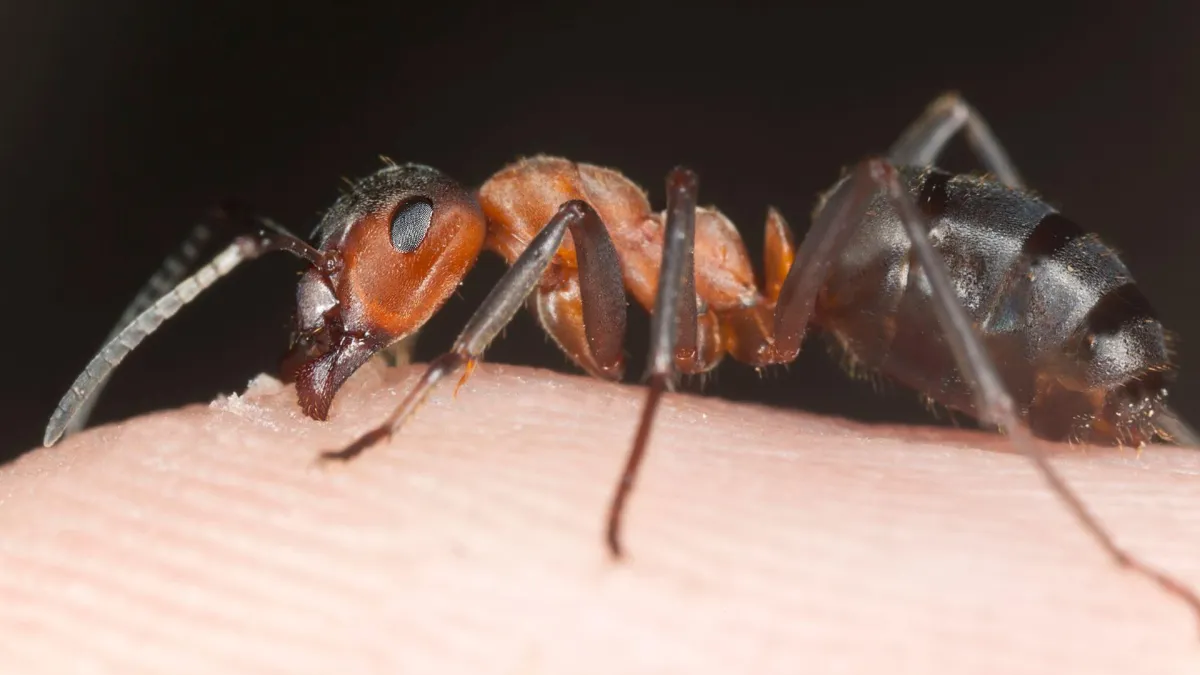Blog
Explore insightful and informative pest control blogs

Ants Bite: What Happens and How to Treat It Fast
Ants bite mainly for defense and protection, with some species delivering more painful bites than others.
Most bites cause mild symptoms, but allergic reactions can occur in rare cases.
Prevention is key—wear protective clothing, avoid disturbing nests, and use effective repellents.
Ant bites can be a painful and irritating experience, especially if you don't know how to handle them. You might be wondering: Why do ants bite? What happens when they do? And how can you avoid them in the future?
In this guide, we'll cover everything you need to know about ant bites—from why they happen to how you can treat and prevent them. Whether you've experienced an ant bite before or you're just looking to protect yourself, this article has you covered.
Do Ants Bite? Understanding the Truth Behind Ant Bites
Yes, some ants do bite, but others sting. It’s important to know the difference:
Biting ants use their mandibles (jaws) to pinch the skin. Some species also release formic acid, causing irritation.
Stinging ants inject venom through a stinger, leading to a burning sensation, pain, and even allergic reactions.
Many people refer to ant stings as "bites," but scientifically, they’re different. Fire ants, for example, both bite and sting, which makes their attack even more painful.
Why Do Ants Bite?

Ants don’t bite humans for fun—they do it for survival. Here’s why an ant might bite you:
Self-defense – When ants feel threatened, they bite to protect themselves.
Nest protection – If you accidentally disturb an ant colony, the worker ants may swarm and bite.
Predatory behavior – Some ants bite to subdue their prey, though this is rare with humans.
Ant bites usually happen when you come into contact with an ant nest or when ants get trapped against your skin (like inside your clothing or shoes).
Types of Ants That Bite
Not all ants bite, but some species are more aggressive than others:
Fire Ants – Their bites are painful, and they follow up with a venomous sting.
Carpenter Ants – These large ants have powerful jaws that can break the skin.
Bullet Ants – Found in South America, their sting is one of the most painful insect stings in the world.
Harvester Ants – These ants deliver painful bites and inject venom.
Other Species – Many other ants can bite if provoked, but most are harmless to humans.
What Happens When an Ant Bites?
The effects of an ant bite vary depending on the species, but common symptoms include:
Mild irritation – Redness, swelling, and a slight burning sensation.
Pain and itching – Some bites cause prolonged discomfort.
Blisters or pustules – Fire ant stings often result in white, pus-filled blisters.
Allergic reactions – In rare cases, severe reactions like difficulty breathing, dizziness, or swelling beyond the bite area can occur.
Allergic Reactions and Risks
While most ant bites are just an annoyance, some people may experience serious allergic reactions. Symptoms of a severe reaction include:
Difficulty breathing or swallowing
Swelling of the face, lips, or throat
Dizziness or confusion
Rapid heartbeat
If you or someone else experiences these symptoms after an ant bite, seek medical attention immediately.
How to Treat an Ant Bite at Home
If you’ve been bitten by an ant, follow these steps for treating ant bite at home:
Immediate First Aid
Wash the bite area with soap and water to prevent infection.
Apply a cold compress to reduce swelling and pain.
Avoid scratching, as it can lead to infection.
Over-the-Counter Remedies
Use hydrocortisone cream or antihistamines to relieve itching.
Take pain relievers like ibuprofen if the bite is painful.
Natural Remedies
Aloe vera – Soothes irritation and reduces inflammation.
Baking soda paste – Helps neutralize the venom and relieve itching.
Honey – Has natural antibacterial properties to prevent infection.
Vinegar – May help reduce pain and swelling.
When to Consult a Doctor
If the bite shows signs of infection (pus, increasing redness, warmth).
If you have a history of severe allergic reactions to insect bites.
If the pain or swelling worsens after a few days.
How to Prevent Ant Bites

Ant bites can be painful and irritating, but the good news is that they are largely preventable. Whether you're spending time outdoors or dealing with ants inside your home, taking proactive measures can help you avoid getting bitten. The most effective way to ensure long-term protection is to eliminate ant infestations at the source—and that’s where calling a professional pest control service becomes essential. Here’s what you can do to reduce your risk of ant bites.
Avoidance Strategies
Be aware of ant-prone areas like grassy fields, woodpiles, and gardens.
Avoid disturbing ant mounds or stepping on trails of ants.
Protective Clothing
Wear long sleeves, pants, and closed-toe shoes when in areas with high ant activity.
Tuck pants into socks if walking through grass or wooded areas.
Insect Repellents
Use ant-repelling sprays containing DEET or picaridin.
Natural alternatives like lemon eucalyptus oil can also help.
Home and Yard Prevention
Keep food sealed to avoid attracting ants.
Seal cracks and crevices where ants may enter your home.
Use ant baits or natural deterrents like diatomaceous earth.
What to Do if You Find a Nest Near Your Home
Identify if the ants are dangerous before disturbing them.
Pour boiling water over small nests to eliminate them naturally.
Call a professional pest control service like Network Pest Control if dealing with aggressive ants like fire ants, harvester ants, or carpenter ants. A pest control expert can safely eliminate the infestation and prevent future problems, ensuring that your home stays ant-free.
If ants are becoming a persistent issue around your property, don’t wait for them to bite—contact us for expert solutions!
Conclusion: Staying Safe from Ant Bites
Ant bites can range from a mild nuisance to a serious health concern, depending on the species and your reaction. The best way to deal with them is through prevention, quick treatment, and knowing when to seek medical help.
If you frequently find ants in your home or yard, consider taking steps to control them before they become a bigger problem. And if you’ve had an allergic reaction before, always carry antihistamines or an epinephrine injector as a precaution.
Frequently Asked Questions About Ants Bite
What happens if an ant bites you?
When an ant bites you, it usually causes mild irritation, redness, and swelling. Some species, like fire ants, also sting, injecting venom that can cause burning pain and blisters. In most cases, symptoms go away within a few hours or days, but allergic reactions can occur in rare instances, leading to more severe symptoms like swelling, dizziness, or difficulty breathing.
What is best to treat an ant bite?
The best way to treat an ant bite is to wash the area with soap and water, apply a cold compress to reduce swelling, and use antihistamines or hydrocortisone cream for itching. Natural remedies like aloe vera, baking soda paste, or honey can also help soothe irritation. If the bite becomes infected or an allergic reaction occurs, seek medical attention.
What does a bite from an ant look like?
An ant bite usually appears as a small red bump, sometimes with a white center, and may be itchy or painful. Fire ant bites often develop into pus-filled blisters, while other species may leave only minor redness or swelling. The severity of the bite's appearance depends on the type of ant and an individual’s skin reaction.
Do house ants bite you?
Most common house ants do not bite humans, as they are more focused on finding food than defending themselves. However, some species, like carpenter ants, can bite if they feel threatened, though their bites are not venomous and rarely cause serious reactions. If you're experiencing frequent bites at home, the culprits are likely fire ants or other aggressive species rather than typical house ants.
Craving a Superior Pest Control Solution?
COMPANY STORY
& EXPERIENCE
Craig Broadhead started his pest business in 2004 in California, called Pacific Pest Control. In 2021, he sold his business and moved his family to Arkansas to start fresh with a new vision of Network Pest Control. His goal it to make sure each customer has the best experience possible.


Network Pest Control
11205 Meadow Lark Rd. Rogers AR 72756
479.888.4249
